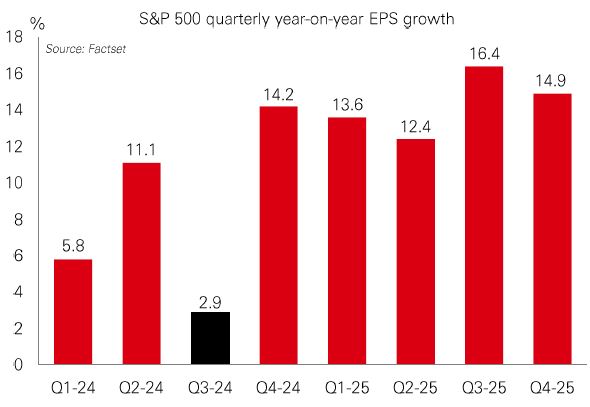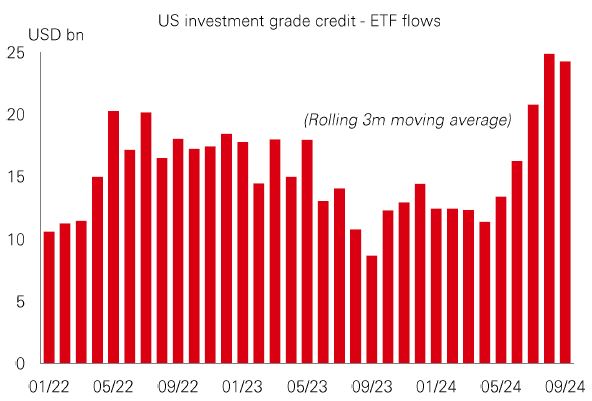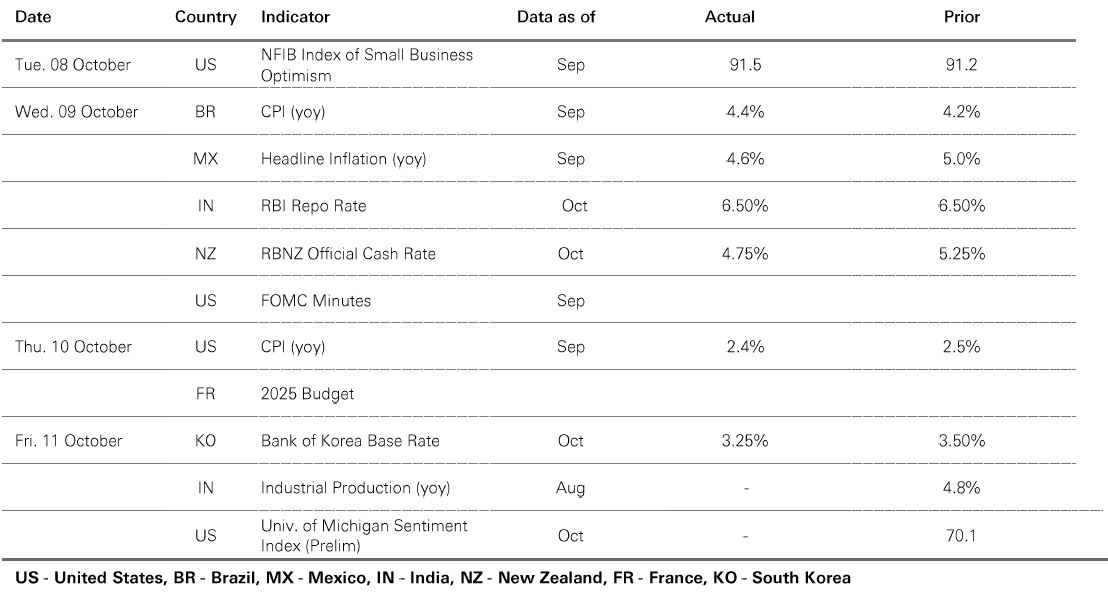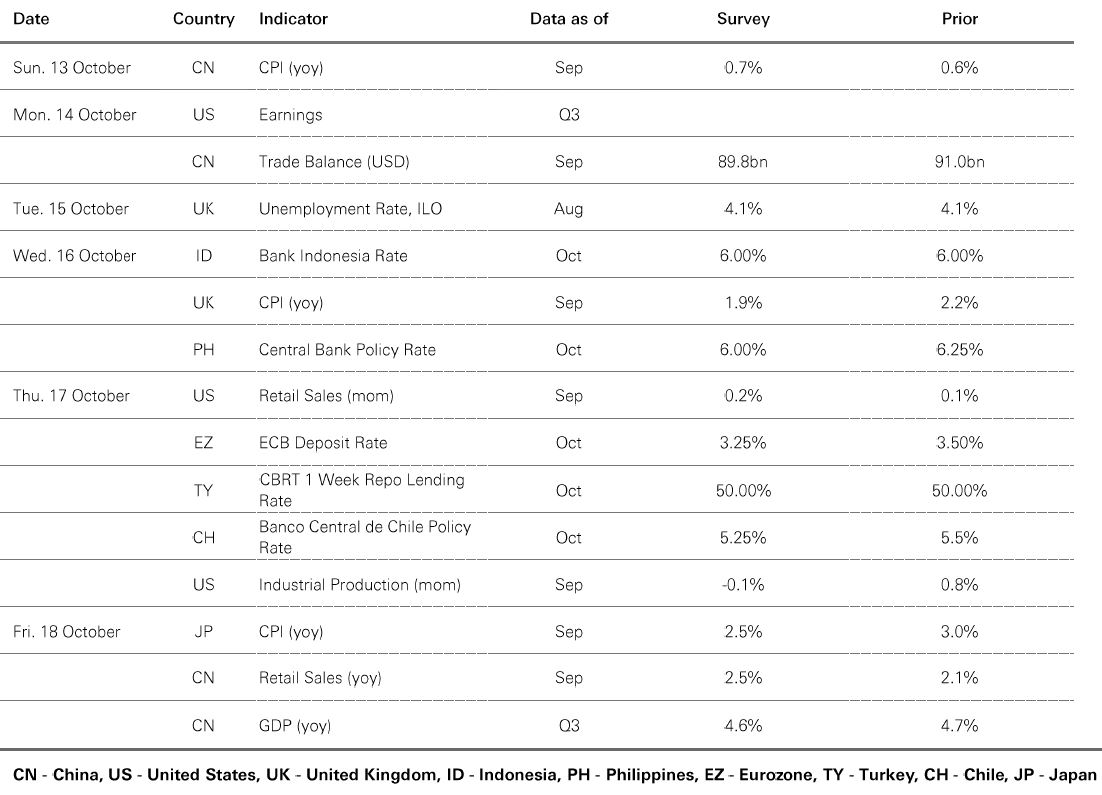
14 October 2024
Q3 results season kicks off this week with 8% of the S&P 500 (by market cap) reporting, and 60% expected by Halloween. Annual consensus profits growth is 10% for this year, and 15% for 2025.
Many Frontier and smaller emerging market countries were relatively quick to respond to the post-Covid inflation surge, hiking rates faster than the US.
Growing expectations of a soft economic landing bode well for US investment grade (IG) debt.

September’s strong US employment report, with non-farm payrolls up 254k (versus 150k expected) and the unemployment rate unexpectedly edging lower to 4.1%, was good news for those hoping for a soft landing for the world’s largest economy. The recent run of better-than-expected economic data (see chart) also coincides with an underlying trend of disinflation – despite September’s stronger-than-expected CPI print. Leading indicators point to a further moderation in price pressures, including the shelter component which is contributing to high services inflation.
August’s market wobble – partly triggered by a weak July payrolls number – now seems like a distant memory. US stock markets are notching up fresh all-time highs and the US 10-year Treasury yield is back above 4%.
A soft landing is good news for global risk assets. But markets are likely to remain volatile as investors grapple with uncertainty over the economic outlook. Rates remain restrictive and the US election has the potential to usher in policy shifts. And despite better US macro news, some labour market data suggests cooling ahead. The October payrolls report could be weak again. Earnings could also disappoint – doubly bad news given stretched valuations.
It was a bumpy week for Chinese stocks as investors digested the recent surge in prices and the National Development and Reform Commission’s (NDRC) announcement that it would accelerate bond issuance to support the economy.
A pause for breath last week isn’t surprising given the extremity of recent market moves – the MSCI China had gained around 26% in the 10 trading days leading up to the Golden Week holiday. Investor expectations around the speed and scale of incoming fiscal support may have become too optimistic.
Despite the lack of details on potential fiscal stimulus offered by the NDRC, it is likely that Chinese authorities will still unveil a meaningful fiscal package in the coming weeks. The Ministry of Finance held a press briefing on 12 October, while another opportunity for action comes at the National People’s Congress standing committee meeting later this month.
The value of investments and any income from them can go down as well as up and investors may not get back the amount originally invested. Past performance does not predict future returns. Investments in emerging markets are by their nature higher risk and potentially more volatile than those inherent in some established markets. The level of yield is not guaranteed and may rise or fall in the future. For informational purposes only and should not be construed as a recommendation to invest in the specific country, product, strategy, sector or security. Any views expressed were held at the time of preparation and are subject to change without notice.
Source: HSBC Asset Management. Macrobond, Bloomberg. Data as at 11.00am UK time 11 October 2024.
Q3 results season kicks off this week with 8% of the S&P 500 (by market cap) reporting, and 60% expected by Halloween. Annual consensus profits growth is 10% for this year, and 15% for 2025. But on a quarterly year-on-year basis, analysts have slashed forecasts for Q3 to just 2.9% – down from 10.2% a year ago. So, what has spooked them?
Economically-sensitive sectors like materials, consumer discretionary (autos/retail), and industrials have seen some of the biggest cuts. Soft economic data over the summer are likely to blame, and lower oil prices hit energy names. But from Q4, that changes. Five quarters of growth averaging 14% (double the long-run average) suggests a rosier outlook.
Technology is set to be the fastest growing sector in Q3, while analysts expect energy to be the weakest. Financial stocks, which are among the first to report, are anticipated to slow. Overall, a low growth bar could offer scope for above-average beats for Q3. But with the market already trading on a relatively high PE of 21x, a soft landing and giddy profit growth from Q4 onwards appear to be priced-in, just as momentum in tech earnings is starting to slip.

Many Frontier and smaller emerging market countries were relatively quick to respond to the post-Covid inflation surge, hiking rates faster than the US. With real rates now significantly positive, they have room to cut – and stimulate growth – without pressuring their currencies. We’ve seen recent cuts in countries like Iceland, Kenya, Pakistan, and Serbia. It’s a trend that should act as a tailwind for Frontier valuations.
It comes as valuation discounts between Frontier and both DM and EM regions remain well above their 5-year averages. Frontier markets are currently trading at a price-earnings ratio of 9.7x – a 51% discount to DMs (at 19.9x) and a 24% discount to EMs (at 12.8x).
Yet, Frontier offers superior earnings growth and higher dividend yields, plus the diversification benefit of low correlation with other asset classes. This is largely being driven by structural trends like the relocation of manufacturing hubs, re-routing of supply chains, social and economic reforms (especially across Gulf Cooperation Council countries), and digitisation.

Growing expectations of a soft economic landing bode well for US investment grade (IG) debt. With Fed policy easing expected to continue at a cautious pace, and recent jobs data mitigating recession worries, 10yr Treasury yields have risen, which has improved the attractive all-in yields that IG debt offers.
IG debt has a high correlation with government bonds. So, if risk appetite falters, IG should be a defensive play as the widening in credit spreads is likely to be, at least partially, offset by the fall in government bond yields.
The fundamental backdrop for IG has also been positive. Corporate profits have been resilient, and the net issuance outlook is expected to remain favourable. Above all, investor demand remains upbeat. There have been strong flows for much of this year into US IG exchange traded funds and the unwinding of popular carry trades during the summer did little to dent investor enthusiasm. The experience suggests that the marginal spread-widening required to attract buyers is smaller than it was in the past.

Past performance does not predict future returns. The level of yield is not guaranteed and may rise or fall in the future. For informational purposes only and should not be construed as a recommendation to invest in the specific country, product, strategy, sector or security. Any views expressed were held at the time of preparation and are subject to change without notice. Source: HSBC Asset Management. Macrobond, Bloomberg, Datastream. Data as at 11.00am UK time 11 October 2024.
| Last week |


Source: HSBC Asset Management. Data as at 11.00am UK time 11 October 2024. For informational purposes only and should not be construed as a recommendation to invest in the specific country, product, strategy, sector or security. Any views expressed were held at the time of preparation and are subject to change without notice.
Risk markets were firm ahead of Q3 earnings season in the US. Core government bonds fell on an upward surprise in September’s employment report. US CPI data also came in stronger than expected. Bunds continued to fare better than US Treasuries as investors priced in a 0.25%, rate cut at October’s ECB Council meeting. In stocks, the US S&P 500 touched a new all-time high, the Euro Stoxx 50 index traded sideways, and Japan’s Nikkei 225 inched higher. Emerging market equities weakened as investors awaited further details on potential fiscal stimulus for the Chinese economy. The Hang Seng fell sharply, with China’s Shanghai Composite also weakening after the Golden Week holiday. The Korean Kospi rebounded, with India’s Sensex little changed. In commodities, geopolitical tensions are supporting energy prices. Copper weakened, while gold was on course to finish the week flat.
Related Insights


Last quarter proved to be an eventful period for investors, as more central banks embarked...[5 Sep]

US recession fears have eased on solid earnings growth along with more constructive labour...[2 Sep]

As expected, the FOMC kept rates unchanged at the July meeting. The Fed funds rate remains...[1 Aug]
This document or video is prepared by The Hongkong and Shanghai Banking Corporation Limited (‘HBAP’), 1 Queen’s Road Central, Hong Kong. HBAP is incorporated in Hong Kong and is part of the HSBC Group. This document or video is distributed and/or made available by HSBC Bank Canada (including one or more of its subsidiaries HSBC Investment Funds (Canada) Inc. (“HIFC”), HSBC Private Investment Counsel (Canada) Inc. (“HPIC”) and HSBC InvestDirect division of HSBC Securities (Canada) Inc. (“HIDC”)), HSBC Bank (China) Company Limited, HSBC Continental Europe, HBAP, HSBC Bank (Singapore) Limited, HSBC Bank Middle East Limited (UAE), HSBC UK Bank Plc, HSBC Bank Malaysia Berhad (198401015221 (127776-V))/HSBC Amanah Malaysia Berhad (20080100642 1 (807705-X)), HSBC Bank (Taiwan) Limited, HSBC Bank plc, Jersey Branch, HSBC Bank plc, Guernsey Branch, HSBC Bank plc in the Isle of Man, HSBC Continental Europe, Greece, The Hongkong and Shanghai Banking Corporation Limited, India (HSBC India), HSBC Bank (Vietnam) Limited, PT Bank HSBC Indonesia (HBID), HSBC Bank (Uruguay) S.A. (HSBC Uruguay is authorised and oversought by Banco Central del Uruguay), HBAP Sri Lanka Branch, The Hongkong and Shanghai Banking Corporation Limited – Philippine Branch, and HSBC FinTech Services (Shanghai) Company Limited (collectively, the “Distributors”) to their respective clients. This document or video is for general circulation and information purposes only.
The contents of this document or video may not be reproduced or further distributed to any person or entity, whether in whole or in part, for any purpose. This document or video must not be distributed in any jurisdiction where its distribution is unlawful. All non-authorised reproduction or use of this document or video will be the responsibility of the user and may lead to legal proceedings. The material contained in this document or video is for general information purposes only and does not constitute investment research or advice or a recommendation to buy or sell investments. Some of the statements contained in this document or video may be considered forward looking statements which provide current expectations or forecasts of future events. Such forward looking statements are not guarantees of future performance or events and involve risks and uncertainties. Actual results may differ materially from those described in such forward-looking statements as a result of various factors. HBAP and the Distributors do not undertake any obligation to update the forward-looking statements contained herein, or to update the reasons why actual results could differ from those projected in the forward-looking statements. This document or video has no contractual value and is not by any means intended as a solicitation, nor a recommendation for the purchase or sale of any financial instrument in any jurisdiction in which such an offer is not lawful. The views and opinions expressed are based on the HSBC Global Investment Committee at the time of preparation, and are subject to change at any time. These views may not necessarily indicate HSBC Asset Management‘s current portfolios’ composition. Individual portfolios managed by HSBC Asset Management primarily reflect individual clients’ objectives, risk preferences, time horizon, and market liquidity.
The value of investments and the income from them can go down as well as up and investors may not get back the amount originally invested. Past performance contained in this document or video is not a reliable indicator of future performance whilst any forecasts, projections and simulations contained herein should not be relied upon as an indication of future results. Where overseas investments are held the rate of currency exchange may cause the value of such investments to go down as well as up. Investments in emerging markets are by their nature higher risk and potentially more volatile than those inherent in some established markets. Economies in emerging markets generally are heavily dependent upon international trade and, accordingly, have been and may continue to be affected adversely by trade barriers, exchange controls, managed adjustments in relative currency values and other protectionist measures imposed or negotiated by the countries with which they trade. These economies also have been and may continue to be affected adversely by economic conditions in the countries in which they trade. Investments are subject to market risks, read all investment related documents carefully.
This document or video provides a high level overview of the recent economic environment and has been prepared for information purposes only. The views presented are those of HBAP and are based on HBAP’s global views and may not necessarily align with the Distributors’ local views. It has not been prepared in accordance with legal requirements designed to promote the independence of investment research and is not subject to any prohibition on dealing ahead of its dissemination. It is not intended to provide and should not be relied on for accounting, legal or tax advice. Before you make any investment decision, you may wish to consult an independent financial adviser. In the event that you choose not to seek advice from a financial adviser, you should carefully consider whether the investment product is suitable for you. You are advised to obtain appropriate professional advice where necessary.
The accuracy and/or completeness of any third party information obtained from sources which we believe to be reliable might have not been independently verified, hence Customer must seek from several sources prior to making investment decision.
Important Information about HSBC Global Asset Management (Canada) Limited (“AMCA”)
HSBC Asset Management is a group of companies, including AMCA, that are engaged in investment advisory and fund management activities, which are ultimately owned by HSBC Holdings plc. AMCA is a wholly owned subsidiary of, but separate entity from, HSBC Bank Canada.
Important Information about HSBC Investment Funds (Canada) Inc. (“HIFC”)
HIFC is the principal distributor of the HSBC Mutual Funds and offers the HSBC Mutual Funds and/or the HSBC Pooled Funds through the HSBC World Selection® Portfolio service. HIFC is a subsidiary of AMCA, and indirect subsidiary of HSBC Bank Canada, and provides its products and services in all provinces of Canada except Prince Edward Island. Mutual fund investments are subject to risks. Please read the Fund Facts before investing.
®World Selection is a registered trademark of HSBC Group Management Services Limited.
Important Information about HSBC Private Investment Counsel (Canada) Inc. (“HPIC”)
HPIC is a direct subsidiary of HSBC Bank Canada and provides services in all provinces of Canada except Prince Edward Island. The Private Investment Counsel service is a discretionary portfolio management service offered by HPIC. Under this discretionary service, assets of participating clients will be invested by HPIC or its delegated portfolio manager, AMCA, in securities, including but not limited to, stocks, bonds, mutual funds, pooled funds and derivatives. The value of an investment in or purchased as part of the Private Investment Counsel service may change frequently and past performance may not be repeated.
Important Information about HSBC InvestDirect (“HIDC”)
HIDC is a division of HSBC Securities (Canada) Inc., a direct subsidiary of, but separate entity from, HSBC Bank Canada. HIDC is an order execution only service. HIDC will not conduct suitability assessments of client account holdings or of the orders submitted by clients or from anyone authorized to trade on the client’s behalf. Clients have the sole responsibility for their investment decisions and securities transactions.
Important Information about the Hongkong and Shanghai Banking Corporation Limited, India (“HSBC India”)
HSBC India is a branch of The Hongkong and Shanghai Banking Corporation Limited. HSBC India is a distributor of mutual funds and referrer of investment products from third party entities registered and regulated in India. HSBC India does not distribute investment products to those persons who are either the citizens or residents of United States of America (USA), Canada, Australia or New Zealand or any other jurisdiction where such distribution would be contrary to law or regulation.
The following statement is only applicable to HSBC Bank (Taiwan) Limited with regard to how the publication is distributed to its customers: HSBC Bank (Taiwan) Limited (“the Bank”) shall fulfill the fiduciary duty act as a reasonable person once in exercising offering/conducting ordinary care in offering trust services/ business. However, the Bank disclaims any guarantee on the management or operation performance of the trust business.
The following statement is only applicable to PT Bank HSBC Indonesia (“HBID”): PT Bank HSBC Indonesia (“HBID”) is licensed and supervised by Indonesia Financial Services Authority (“OJK”). Customer must understand that historical performance does not guarantee future performance. Investment product that are offered in HBID is third party products, HBID is a selling agent for third party product such as Mutual Fund and Bonds. HBID and HSBC Group (HSBC Holdings Plc and its subsidiaries and associates company or any of its branches) does not guarantee the underlying investment, principal or return on customer investment. Investment in Mutual Funds and Bonds is not covered by the deposit insurance program of the Indonesian Deposit Insurance Corporation (LPS).
THE CONTENTS OF THIS DOCUMENT OR VIDEO HAVE NOT BEEN REVIEWED BY ANY REGULATORY AUTHORITY IN HONG KONG OR ANY OTHER JURISDICTION.
YOU ARE ADVISED TO EXERCISE CAUTION IN RELATION TO THE INVESTMENT AND THIS DOCUMENT OR VIDEO. IF YOU ARE IN DOUBT ABOUT ANY OF THE CONTENTS OF THIS DOCUMENT OR VIDEO, YOU SHOULD OBTAIN INDEPENDENT PROFESSIONAL ADVICE.
© Copyright 2024. The Hongkong and Shanghai Banking Corporation Limited, ALL RIGHTS RESERVED.
No part of this document or video may be reproduced, stored in a retrieval system, or transmitted, on any form or by any means, electronic, mechanical, photocopying, recording or otherwise, without the prior written permission of The Hongkong and Shanghai Banking Corporation Limited.
Important information on sustainable investing
“Sustainable investments” include investment approaches or instruments which consider environmental, social, governance and/or other sustainability factors (collectively, “sustainability”) to varying degrees. Certain instruments we include within this category may be in the process of changing to deliver sustainability outcomes.
There is no guarantee that sustainable investments will produce returns similar to those which don’t consider these factors. Sustainable investments may diverge from traditional market benchmarks.
In addition, there is no standard definition of, or measurement criteria for sustainable investments, or the impact of sustainable investments (“sustainability impact”). Sustainable investment and sustainability impact measurement criteria are (a) highly subjective and (b) may vary significantly across and within sectors.
HSBC may rely on measurement criteria devised and/or reported by third party providers or issuers. HSBC does not always conduct its own specific due diligence in relation to measurement criteria. There is no guarantee: (a) that the nature of the sustainability impact or measurement criteria of an investment will be aligned with any particular investor’s sustainability goals; or (b) that the stated level or target level of sustainability impact will be achieved.
Sustainable investing is an evolving area and new regulations may come into effect which may affect how an investment is categorised or labelled. An investment which is considered to fulfil sustainable criteria today may not meet those criteria at some point in the future.